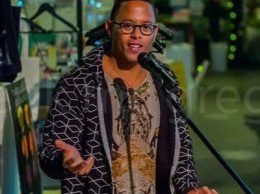Kanye West Is Not a Feminist But I Am!
The following essay is a response to “Kanye West Is Not A Feminist But…” For more information, please see the initial essay as well as the follow-up response.
_____________________________________________________________
By Ronald B. Neal
Nearly twenty years ago, bell hooks interviewed West Coast gangster rap pioneer Ice Cube. The interview became a chapter for her classic text, Outlaw Culture. Upon interviewing Ice Cube, hooks encountered much criticism from her feminist colleagues for choosing him as an interview subject. For many feminists, then (and now), Ice Cube was (and still is) the embodiment of misogyny in hip hop. Given the frequency of “bitches” and “ho’s” in his lyrical repertoire he was unworthy as an interlocutor. Despite protests from her fellow feminists, hooks carried on and engaged the politics of Ice Cube; she engaged him at the level of race and gender. When hooks interviewed Ice Cube she did so not with a blind eye to the sexism in his work, nor with a black woman’s burden to protect a black male. Rather, she engaged Ice Cube with an eye toward complexity.
As an intellectual and a black woman, hooks pondered a very important question: Why do you say the things that you say about women in your music? This very important query was complicated by irony and contradiction: there were black women in Ice Cube’s life who seemingly (at least from an outsider’s perspective) did not fit into his universe of bitches and ho’s. From what is publicly known about Ice Cube, he was and still is married to a woman, a black woman. Further, much of his success as an artist was engineered by a woman, a black woman, who managed him. Patricia Charbonnet, whose story has yet to be told, was a major force behind his early accomplishments as a rapper and filmmaker, especially the Friday series. To be sure, these select black women do not excuse Cube’s sexism. The sexism in his work is indefensible but his relationships with and disposition toward women warranted investigation.
In her engagement with Ice Cube bell hooks enacted a practice that I call Outlaw Feminism. In the spirit of her wonderful book, Outlaw Culture, Outlaw Feminism challenges and breaks the codes of inherited masculinity and heirloom femininity. It goes against the rules of purity with respect to political and cultural engagement. It’s about getting your hands dirty, ruining your nails, breaking your heels and messing up your suit, tie and hair, all for the sake of truth, understanding, and most importantly, transformation. Outlaw Feminism is tantamount to Erykah Badu walking down the streets of downtown Dallas, Texas with no clothes on. Outlaw Feminism is the feminism of complexity.
This is the kind of feminism that one sees in Decoded, the recent and masterful lyrical autobiography of Jay-Z, written by bell hooks inspired feminist/veteran hip hƒop journalist, dream hampton. Jay-Z is not a feminist, but hampton had no problem whatsoever with interpreting the life and times of Shawn Carter for the entire world. This included a creative explication of his attitudes toward women, patriarchal sentiments that can be found in his lyrics from “Big Pimpin’” to “Girls, Girls, Girls” to ode’s to “..the hottest chick {Beyonce}in the game.” For the first time ever in the history of hip hop (and probably the history of African American art), a black woman writer walked into the mind of a history making artist—a black male—and gives us the back story behind his biggest records, especially his most sexist hit records. This is what happens when feminism meets hip hop, outlaw style. This is what I attempted to do in my post on Kanye West.
In no way was my post intended to idealize and defend the masculinity of Kanye West. In no way was it intended to demean, belittle or render invisible the complex gender struggle in the lives of women, black women in particular. American society and the rest of the world remain unreconstructed where intersectional inequality, race, class and gende rare concerned. After four decades of Second Wave feminist activism, masculine religion is still intact. There are huge regions in our society that have gone virtually untouched by any women’s movement, black, white, Latina, Asian, etc. And it is much bigger than popular culture, especially hip hop. In a word, it’s deeper than rap!
Kanye West’s recent video for his song “Monster” is a symbolic mirror of just how much work has to be done. Yes, Kanye West turned himself into a poster child for misogynistic manhood and yes, his visuals do very little to deter womanizing. But, I think that Kanye knows better and knows otherwise. I am convinced of this. As I indicated in my post, there are aspects of his art that suggest that he knows another way. Further, I think that his deceased mother, who was an educator, a college professor, schooled him on the ethical treatment of women. If he is in any way a complex artist then much of this complexity can be attributed to the woman who gave him birth. His mother gave him something early on that is still with him.
Having stated the above, my post was simply an attempt, albeit an imperfect one, at saying that Kanye West is complex. By saying that Kanye West is not Snoop Dogg, Too Short, Ludacris and the late Pimp C, I am not saying that he is a milder and gentler sexist. By saying that he does not treat women as indentured servants or three-fifths of a person, I am not saying that racism is worse than sexism (women were among the indentured and the enslaved). I am not asking women, black women in particular, to be good and supportive cheerleaders and uphold a code of silence and protect a strong black man. I could care less about how angry some men become when women criticize and challenge them (us). The female critique of men is a rite of passage for men.
The point that I attempted to make is that the masculinity of Kanye West with respect to hip hop is different and hard to label. The masculine vulnerability and emotional transparency that I pointed to are what make him different. Although sexist sentiments are expressed in his art, he challenges and breaks a code of traditional masculinity which has negative consequences for women and men. The song and video for “Monster” and the song and video for “Runaway” (which is thirty minutes longer than Monster) make this point. These are two completely different portraits of Kanye West. Yet “Runaway” is way more advanced, at every level, especially gender, than “Monster.” This is what makes him harder to reduce to a single label. In an ironic and tragic way, this is what makes him a serious artist.
Kanye West is a serious artist who pushes the race, class, and gender envelope with each installment of his unfinished masculine art. West is a serious artist who is intentionally provocative. He is a self-absorbed existential artist who knows that people will love him or hate him for his creative risk-taking and “shock art.” He is a megalomaniacal hip hop genius who will do just about anything to make us look at him. He is a man who begs for attention. Now, does this give him a pass? No! Shall we ignore the sexism in his work? Hell no! This only means that he is complex. It also means that the work of gender progress is unfinished. There is more work for all of us to do, including Kanye West.
Why is complexity important for the work that needs to be done? Complexity is significant because without it, bell hooks would have never interviewed Ice Cube. Without it, dream hampton would have never written Decoded. Without it, Joan Morgan would have never written a transparent work of feminist prose such as When Chickenheads Come Home to Roost. Without it, a sorority of young black female intellectuals, who’ve been influenced by the booty shaking aesthetic of Lil Jon, would have never formed, The Crunk Feminist Collective. To be sure, misogyny is a terrible and wicked thing. Violence and hatred toward women are appalling and indefensible. But apart from thoughtless and thoughtful misogynistic practices, gender relations are very complicated. Without engaging the complicated nature of gender relations we will not move any further than where we are in the pursuit of better relations between women and men. As an Outlaw Feminist, I remain committed to engaging such complexity. I invite you to join me.
_______________________________________________________________
 Ronald B. Neal holds a Ph.D. in Religion, Ethics, and Culture from Vanderbilt University. He is a Visiting Assistant Professor in the Department of Religion at Wake Forest University in Winston-Salem, North Carolina. His research and writing interests include: religion, gender, and culture, religion, ethics, and politics, modern and postmodern philosophy, Third World Studies, and popular culture. He is the author of the forthcoming book, Democracy in 21st Century America: Notes on Race, Class, Religion, and Region (Mercer University Press). He is currently at work on an untitled book on religion, masculinity, and hip hop.
Ronald B. Neal holds a Ph.D. in Religion, Ethics, and Culture from Vanderbilt University. He is a Visiting Assistant Professor in the Department of Religion at Wake Forest University in Winston-Salem, North Carolina. His research and writing interests include: religion, gender, and culture, religion, ethics, and politics, modern and postmodern philosophy, Third World Studies, and popular culture. He is the author of the forthcoming book, Democracy in 21st Century America: Notes on Race, Class, Religion, and Region (Mercer University Press). He is currently at work on an untitled book on religion, masculinity, and hip hop.










4 Comments